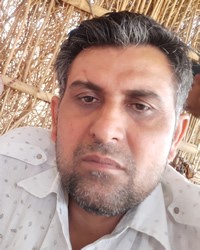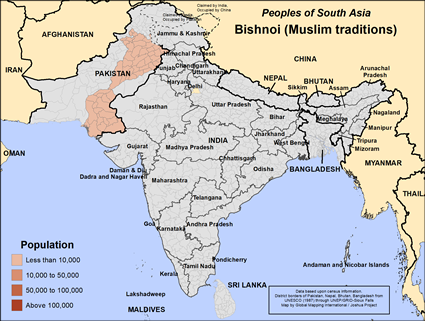Bishnois were founded by a Rajput of Bikaner, who was born in 1451 A.D, and was therefore a contemporary of Baba Nanak, the originator of Sikhism, and is buried in Talwa/Mukam in Bikaner. His spiritual name was Jambhaji. He left his followers a scripture in the Nagri character called Shabdwani. The adherents of the sect are the descendants of immigrants from Bikaner, parts of Haryana and Punjab and are exclusively Jats or some Rajputs by caste, though they often abandon the caste name and describe themselves simply as Bishnois. They are freely involved in marriages with Jat people, Rajputs or among themselves.
Some are in neighboring Pakistan where they have adopted Islam rather than Hinduism or Sikhism.
They are good cultivators and keep cattle in large numbers. Today Bishnoi's have drastically grown in the fields of IT jobs as engineers or government sectors as military personnel or social workers. They have a ceremony of initiations, somewhat similar and known by the name as that of Sikhs.
Bishnois love wild animals. In recent years, the Bishnoi community has launched protests against the killing of black bucks by Salman Khan, a Bollywood film star and Mansur Ali Khan of Pataudi, a former Indian cricketer. It is because of their protection that in Bishnoi-dominated areas, deer and antelope (such as blue bulls, black bucks, chinkaras and chowsinghas) are still grazing in their fields despite the water shortages in their home state of Rajasthan.
They are teetotalers and normally they wear white shirts, dhotis and turbans. This dress pattern is ideal for the hot dry desert climate. They pay special attention to cleanliness in their houses. Only one crop of pearl millet (bajra) is grown during the monsoon season. The bushes, which grow in the fields, protect the loose sand from wind erosion and provide the much-needed fodder for animals during a famine.
Bisnois often live in little hamlets called 'Dhannis ', with just a few round huts with intricate thatched roofs. The mud floors are plastered with cow dung to keep vermin away. The interiors are airy and clean. There is a granary to guard their rations and a sump for stored water.
The people are Sunni Muslims who believe that the supreme God, Allah, spoke through his prophet, Mohammed, and taught mankind how to live a righteous life through the Koran and the Hadith. To live a righteous life, you must utter the Shahada (a statement of faith), pray five times a day facing Mecca, fast from sunup to sundown during the month of Ramadan, give alms to the poor, and make a pilgrimage to Mecca if you have the means. Muslims are prohibited from drinking alcohol, eating pork, gambling, stealing, slandering, and making idols. They gather for corporate prayer on Friday afternoons at a mosque, their place of worship.
The two main holidays for Sunni Muslims are Eid al Fitr, the breaking of the monthly fast and Eid al Adha, the celebration of Abraham's willingness to sacrifice his son to Allah.
Sunni religious practices are staid and simple. They believe that Allah has pre-determined our fates; they minimize free will.
In most of the Muslim world, people depend on the spirit world for their daily needs since they regard Allah as too distant. Allah may determine their eternal salvation, but the spirits determine how well we live in our daily lives. For that reason, they must appease the spirits. They often use charms and amulets to help them with spiritual forces.
The Bishnoi people in Pakistan live in an Islam-oriented country, and there are probably no Christ followers among them or among their near neighbors. Who will go to them?
Pray for the Lord to pave the way for the gospel to move among the Bishnoi people.
Pray for Bishnoi community leaders to open the door to allowing Jesus Christ to bless their families.
Pray for a Disciple Making Movement among the Bishnoi in Pakistan.
Pray for them to have hearts that long for true spiritual nourishment that can only come from Jesus Christ.
Scripture Prayers for the Bishnoi (Muslim traditions) in Pakistan.
| Profile Source: Joshua Project |











